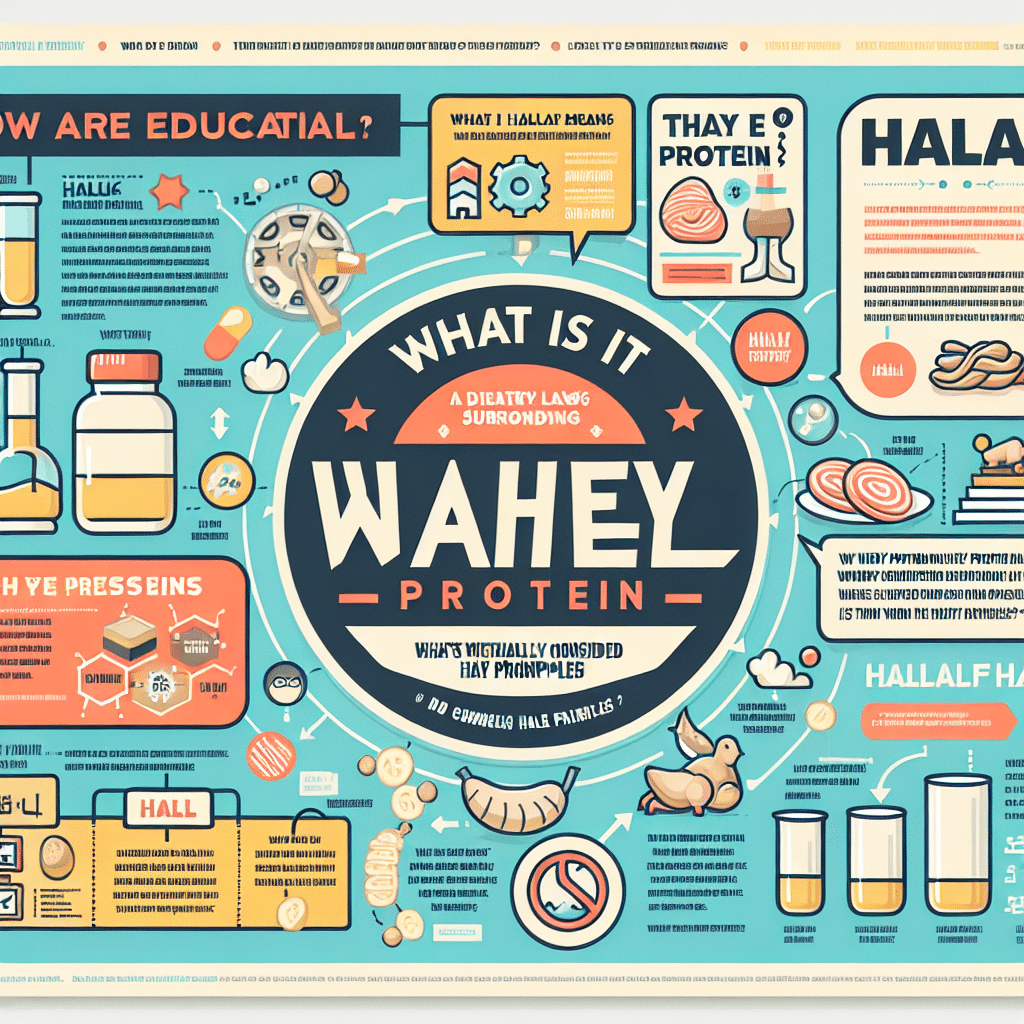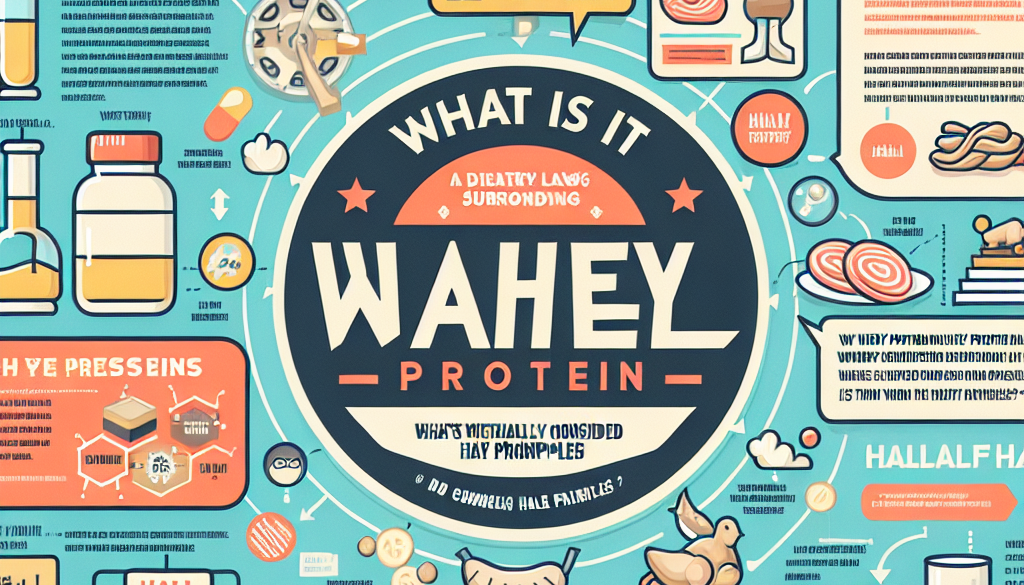Is Whey Protein Halal? Understanding Dietary Laws
-
Table of Contents
- Whey Protein and Halal Compliance: A Detailed Analysis
- Understanding Halal Dietary Laws
- What is Whey Protein?
- Is Whey Protein Halal?
- Source of Milk
- Rennet in Cheese-Making
- Cross-Contamination Controls
- Halal Certification for Whey Protein
- Case Studies and Examples
- Statistics on Halal Whey Protein Market
- Conclusion: Key Takeaways on Halal Whey Protein
- Discover ETprotein’s Halal-Certified Protein Products
Whey Protein and Halal Compliance: A Detailed Analysis

For many fitness enthusiasts and those looking to supplement their diet with additional protein, whey protein has become a staple. However, for Muslims who follow halal dietary laws, the question of whether whey protein is permissible is of paramount importance. This article delves into the intricacies of halal dietary laws and examines the halal status of whey protein, providing valuable insights for consumers who wish to adhere to these guidelines.
Understanding Halal Dietary Laws
Halal, an Arabic word meaning “permissible,” refers to what is allowed under Islamic law. In the context of food, halal dietary laws are derived from the Quran, Hadith (sayings of Prophet Muhammad), and rulings by Islamic scholars. These laws dictate not only the types of food that are permissible but also the methods of preparation, processing, and handling.
- Prohibition of certain animals and by-products, such as pork and alcohol.
- Requirements for the humane slaughter of animals, including a swift incision to the throat while invoking the name of Allah.
- Avoidance of cross-contamination with non-halal substances during preparation and processing.
What is Whey Protein?
Whey protein is a by-product of cheese production and is a complete protein, containing all nine essential amino acids. It is highly regarded for its high biological value and rapid absorption rate, making it a popular choice among athletes and those looking to increase their protein intake.
Is Whey Protein Halal?
The halal status of whey protein depends on various factors, including the source of the milk, the rennet used in cheese-making, and the cross-contamination controls in place during manufacturing.
Source of Milk
Milk itself is generally considered halal, but the conditions under which the animals are raised can affect the permissibility. For instance, if the animals are treated with hormones or fed with non-halal feed, some scholars may question the halal status of the milk and its derivatives.
Rennet in Cheese-Making
Rennet, an enzyme used to curdle milk in cheese-making, can be of animal, plant, or microbial origin. Animal rennet derived from non-halal slaughtered animals renders the cheese (and subsequently the whey) non-halal. However, if the rennet is from halal-slaughtered animals, plant-based, or microbial enzymes, the resulting whey protein would be considered halal.
Cross-Contamination Controls
Strict controls must be in place to prevent cross-contamination with non-halal substances. This includes separate equipment, storage, and transportation for halal and non-halal products.
Halal Certification for Whey Protein
To ensure whey protein is halal, many consumers rely on halal certification. Halal certification bodies assess the production process, ingredients, and handling to certify that the product meets all halal requirements. Certified halal whey protein products provide assurance to consumers about their permissibility.
Case Studies and Examples
Several case studies highlight the importance of halal certification for whey protein products. For example, a study conducted by the Islamic Food and Nutrition Council of America (IFANCA) found that the demand for halal-certified whey protein is on the rise, as more consumers seek assurance about the products they consume.
In another instance, a major whey protein brand sought halal certification to cater to the growing Muslim market. The certification process involved rigorous audits and adjustments to their production line to ensure compliance with halal standards.
Statistics on Halal Whey Protein Market
The global halal food market is growing rapidly, with the halal protein segment, including whey protein, expanding significantly. According to a report by Grand View Research, the global halal food market size was valued at USD 1.9 trillion in 2020 and is expected to grow at a compound annual growth rate (CAGR) of 3.1% from 2021 to 2028.
Conclusion: Key Takeaways on Halal Whey Protein
In conclusion, whey protein can be halal if it adheres to Islamic dietary laws, including the source of milk, the type of rennet used, and the prevention of cross-contamination. Halal certification plays a crucial role in providing consumers with the confidence that the whey protein they consume is permissible. As the demand for halal products continues to rise, more manufacturers are likely to seek halal certification for their whey protein products.
Discover ETprotein’s Halal-Certified Protein Products
If you’re looking for halal-certified protein options, ETprotein offers a range of plant-based protein products that meet strict halal standards. Their selection includes organic rice protein, pea protein, and various seed proteins, ensuring that you have access to high-quality, permissible protein supplements.
About ETprotein:
ETprotein, a reputable plant protein vegan protein Chinese factory manufacturer and supplier, is renowned for producing, stocking, exporting, and delivering the highest quality organic bulk vegan protein and plant proteins. They include Organic rice protein, clear rice protein, pea protein, clear pea protein, watermelon seed protein, pumpkin seed protein, sunflower seed protein, mung bean protein, peanut protein etc. Their offerings, characterized by a neutral taste, non-GMO, allergen-free attributes, cater to a diverse range of industries. They serve nutraceutical, pharmaceutical, cosmeceutical, veterinary, as well as food and beverage finished product distributors, traders, and manufacturers across Europe, USA, Canada, Australia, Thailand, Japan, Korea, Brazil, and Chile, among others.
ETprotein specialization includes exporting and delivering tailor-made protein powder and finished nutritional supplements. Their extensive product range covers sectors like Food and Beverage, Sports Nutrition, Weight Management, Dietary Supplements, Health and Wellness Products, and Infant Formula, ensuring comprehensive solutions to meet all your protein needs.
As a trusted company by leading global food and beverage brands and Fortune 500 companies, ETprotein reinforces China’s reputation in the global arena. For more information or to sample their products, please contact them and email sales(at)ETprotein.com today.












